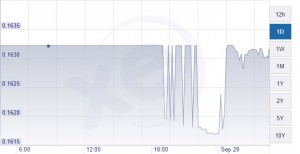Over the weekend, pro-democracy protests occurred in the city of Hong Kong, with protesters demanding truly free and democratic elections for the leader of the city in 2017. This follows Beijing’s announcement that candidates will be vetted before being allowed to run, raising concerns of a limited set of candidates that will not represent the will of the people.
Protesters have occupied city streets and public areas and clashed with police forces, who fired tear gas and pepper spray to disperse the protesters. The situation is seen as “the largest crackdown since the Asian city returned to Chinese rule” (Bloomberg). Not only does this raise questions of political stability and viability in Beijing and China at large, but the protests and public attention have had international and financial consequences. Major cities around the world, such as New York and London, saw solidarity protests by Chinese and natives alike (Wall Street Journal). The U.S. White House also received a petition (with more than the 100,000 signatures required for an executive response) demanding the U.S. pressure the government of China to allow free and democratic elections in Hong Kong (Wall Street Journal)
Furthermore, worry about uncertain future in the city caused the value of the yuan to fall “the most in two weeks” (Bloomberg). The offshore yuan (used in Hogn Kong) fell by 0.19% and the onshore (mainland) fell by 0.16%. These falls, coupled with a stronger dollar-to-yuan because of strong Federal Reserve outlooks, and recent lowered numbers for Chinese growth forecasts have investors worrying about assets in the country. China’s domestic political problems don’t stop at the borders. They spill over into international political economy and into world financial markets. Being a global player has global consequences.
Sources:
Bloomberg. Lilian Karunungan. Offshore Yuan Falls Most in Two Weeks Amid Hong Kong Protests. September 28, 2014.
Wall Street Journal. Hong Kong Pro-Democracy Movement Gets Global Support.September 28, 2014.
XE Exchange Rates. Graphic. Chinese Yuan Renminbi to US Dollar Chart

Very interesting situation in Hong Kong right now. I have actually read a few articles stating the protests over in Hong Kong could result in another Tiananmen Square Massacre. Although I doubt China would do something like that out of fear of bad publicity, I am curious how Western nations will respond to this ordeal.
You’ve got a good idea, though in this case your forex chart shows the rate bouncing back to its original level. (The journalist may have looked at the rate some time before filing the story…) Can you however find other, perhaps better indicators? Stories on hotel occupancy or other tourism-related items? Stock prices for companies that operate primarily in Hong Kong [as opposed to merely having a HQ there]? There’s a sizeable literature on potential indicators, “event analysis” is the jargon.
Very telling piece on the state of the Chinese government and how it handles freedom of speech issues like this. It will be interesting to see what the long term economic impacts will be. With growth already slowing, events similar to this could really put a burden on growth. The central government needs to consider both human rights and economic impacts when making decisions on how to handle events like this now and in the future.